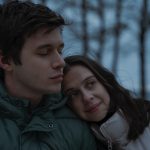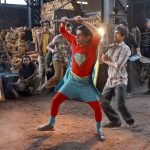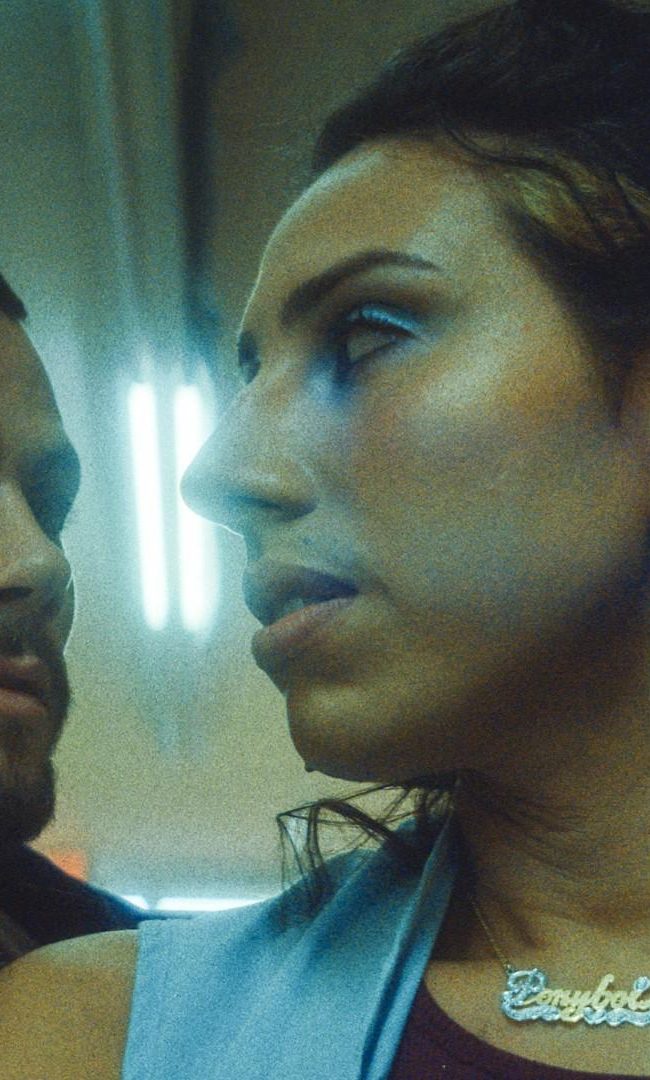A Conversation with Flora Lau (LUZ)
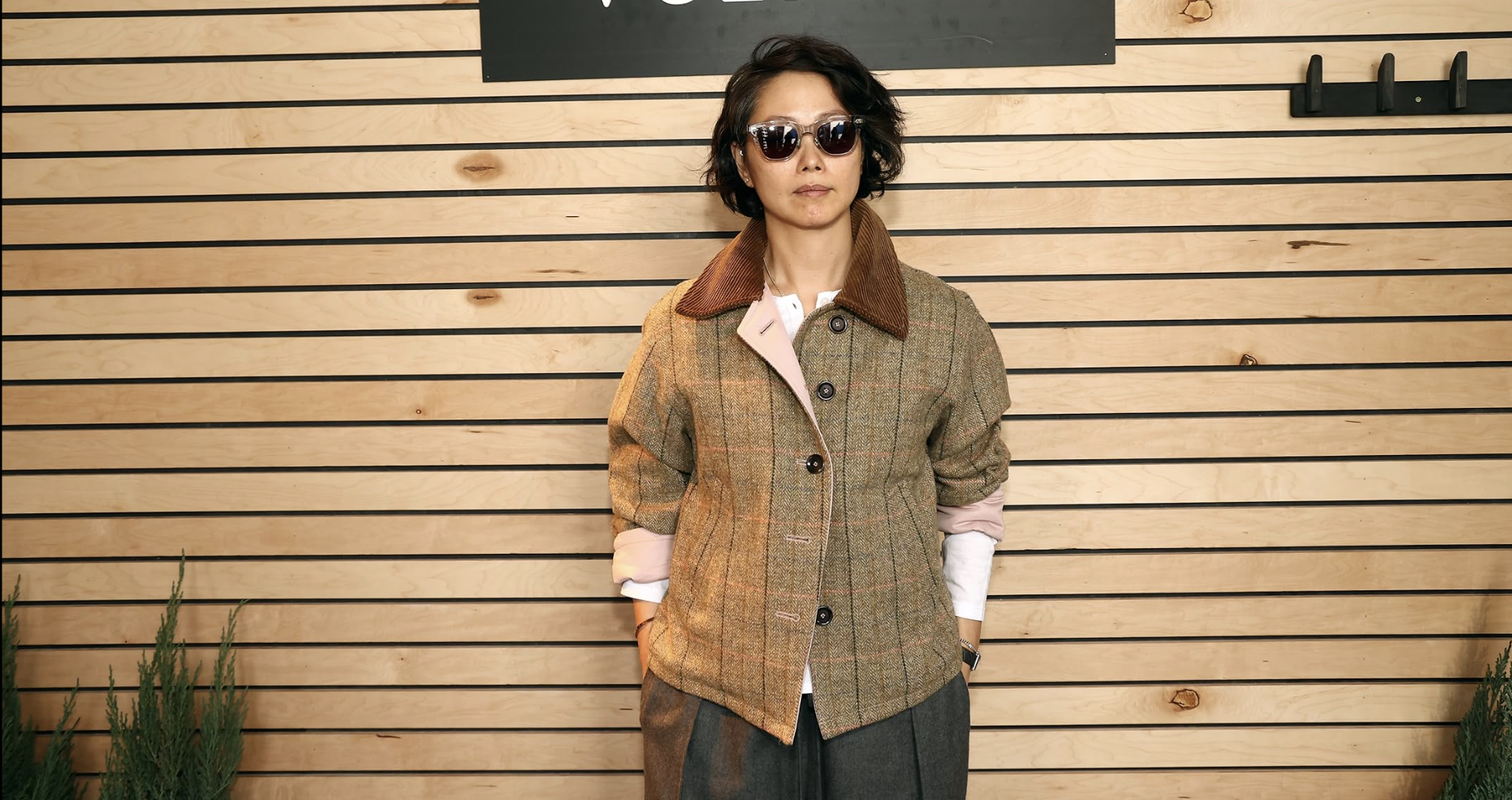
Premiering in the World Dramatic Competition at Sundance 2025, Luz is an ambitious exploration of reality, connection and redemption from director Flora Lau (Bends). Set across Chongqing, Hong Kong and Paris, the film follows Wei (Xiao Dong Guo), a reformed ex-con searching for his estranged daughter, and Ren (Sandrine Pinna), a gallerist grappling with her dying stepmother Sabine (Isabelle Huppert). Their parallel journeys intersect in a virtual reality world where the pursuit of a mystical deer mirrors their real-world struggles with family, belonging and truth.
Shot by award-winning cinematographer Benjamin Echazarreta (A Fantastic Woman) and featuring an original score by composer Mimi Xu, the film weaves together neon-drenched cityscapes, intimate family drama, and innovative VR sequences to create a meditation on what is real and illusory in our increasingly digitized world. Through its unique visual language and great performances, Luz examines how technology both connects and alienates us while asking profound questions about the authenticity of human relationships across physical and virtual realms. It was great to speak with Flora Lau in the following conversation edited for length and clarity.
Hammer To Nail: What was the inception of this story? It is so specific and unique.
Flora Lau: I have always been fascinated by what is real and what is not. In ancient philosophy it always talks about how what we see, what we hear, what we touch, it’s all an illusion. This kind of concept I have always tried to find a solution to. The idea that everything around us is an illusion but what is inside of us is real was fascinating to me. When VR came out, it was the perfect kind of tool to explore this concept further. It was a great way to be able to express it visually. When I first started writing this script. VR technology had just come out. Someone gave me a set of VR goggles and there were only 2 games to play at the time. It quickly became pretty boring. What interested me was watching my friends play. They all did it very differently. Some people take their time to explore the world and get their bearings, while others just want to get to the next level as quickly as possible. They will even go online to look for a cheat sheet! I think that really reflects the person’s personality and how they tackle something new.
HTN: I love the opening title credits, which flow beautifully into this image of the deer and into this neo noir crime sequence. It sets the tone for the film so well. What was your thinking here and at what point in the writing process did this sequence come to you?
FL: Everything progressively came together. Chongqing is a very fascinating place. It is so futuristic just because of the landscape. It’s very hilly and their buildings are on the mountains. A lot of these highways are on top of the mountains or in between them. It is a very futuristic, neon and Blade Runner–esque city. It was amazing to shoot there. Even as an Asian person who is used to these Neon cities, I was overwhelmed because stuff like LED lights that transition from one building to the next. that kind of stuff is not even in Japan yet. At night there are sometimes LED shows that involve 20 buildings. I knew I wanted an opening title of Neon signs. I met this Japanese designer in Paris (Tom Kan). He also did the opening for Gaspar Noe’s Enter The Void. He is very detailed with his design. The Chinese characters mixing with English is quite difficult to design. The deer came later. After we had shot the real world we added it in post production.
HTN: Video game characters and virtual worlds often have uncanny or odd physicalities to them. There’s certainly a major shift in aesthetic when we enter the video game world. What was important to you in creating this world and what was your instruction for the actors when in the world vs not.
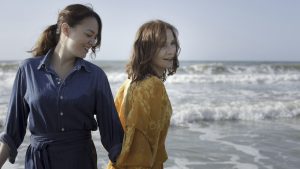
A still from LUZ
FL: For the character of Ren (Pinna), she is very comfortable in the VR world. She is more herself. She moves a lot faster, more confident, certain; her movement is very swift. In the real world she is a little lost. She is not sure of what to do and is disconnected from the world and her mother. Her real life is a lot slower. For Wei (Dong Guo), he is much more confident in the real world. He has no clue what he is doing in the virtual world and is very awkward.
HTN: An hour into the film there’s a repeated moment where Wei is trying to explain he is not the father to Huang Lu’s child. The contrast being that his actions speak otherwise…”Why can’t you just be happy,” she says. What was your thinking with this moment and the dynamic generally.
FL: It’s ironic that he does have this half daughter. He also knows that Huang Lu is looking for a better life and he is not really included in that life. He is trying to find his real daughter so it is Ironic that this little girl really sees him as a father while he is being rejected virtually by his real daughter. It was another way to dive into this theme of real and unreal.
HTN: The sequence where Wei rekindles with Huang Lu drunk, she says, “I don’t need your sympathy.” The physicality in this scene is very interesting. It feels like a microcosm for the type of strange connection you were trying to portray. What was your thinking here?
FL: The night club is such a strange place. They obviously watch out for each other and do actually form a bond. Huang Lu’s character, even though she likes Wei, she does not think that he is the right person to include in her life. Her main focus is to get her daughter out of this situation. That is why she decides to leave. That moment becomes almost a defining moment for the two of them as they decide whether to continue the relationship or not. It’s a push and pull kind of situation.
HTN: The adventure Sabine (Huppert) takes with Ren in the middle of the night. They discuss the father, they find the deer and they have a nice connection in that really beautiful location. What was your thinking in this sequence?
FL: Sabine Has a strange memory of her step mom. She thinks that all these nice memories were created by her father, when in reality, they were actually started by Isabella’s character. She is discovering at this moment that the person who was always wanting to do adventures in the middle of the night was not her father, it was actually Isabella’s idea! All throughout her childhood she thought the opposite. It creates a nice revelation that Isabella played more influence on her life than she realized.
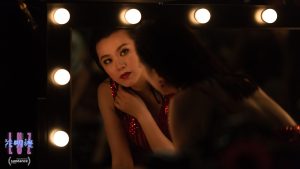
A still from LUZ
HTN: Further on in their adventure they go into the ocean. It’s a beautiful moment in the film, a rare connection to nature in this otherwise cyber film. What was your thinking and talk about visually depicting the water? I think you did it so well.
FL: It was really cold. The whole crew was in wetsuits. We only had two chances to shoot this because we had one extra costume. To reset it takes a long time and it’s too cold for the actors, but both of them were really in the moment. They did not think about the cold, it was very real. Isabella walked into the water first.. She is trying to show the daughter how to live because she is dying. It’s her last moments to show the daughter what life is really about. Isabella is so good at physical acting, she did not need any directions. We talked about the scene but we could not rehearse it.
HTN: The intense dance sequence seamlessly enters the film and is quite arresting. How did this moment come to be and how was the dancer cast?
FL: I wanted this to be about rebirth. It’s the rebirth of Ren and her relationship with the Mom. You see Isabella having a down moment after that because she realizes the end of her life is coming, which is also a form of rebirth. The dancer is quite a famous choreographer in Paris. I told her the concept and she came up with all of these moves. I did a little fine tuning with her. I think the music suddenly worked so well. I was telling our composer the concept separately and when we came together on set it would be the first time the music and dance moves would be put together and it worked! We did not have to edit anything. Somehow all the movements lined up perfectly.
HTN: It’s a really great scene. This moment where Wei finally find his daughter on the rooftop, he pleads for her to listen to him…she disappears…the camera cuts to a long shot and the somberness really sets in. it’s a powerful moment, what was important to you when depicting it
FL: He was desperate and it’s the moment where he finally finds her. He thinks, “Well, what do I say now?” You’ve thought it through a million times, but when it finally comes out, it’s something else. What he wanted to say was please give me a chance. I wanted to keep what she would do mysterious, so I kept her back to the audience. You can tell from the back that she is deciding on whether she should give this man a chance. It was a way to keep the audience on their toes.
– Jack Schenker (@YUNGOCUPOTIS)

